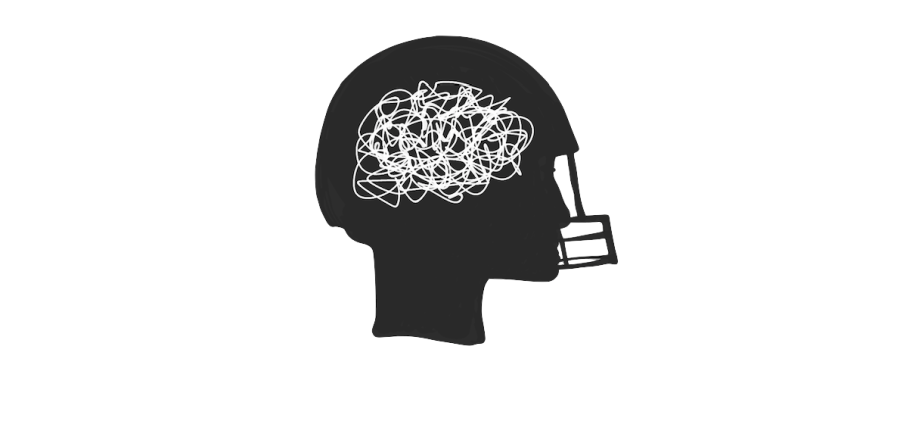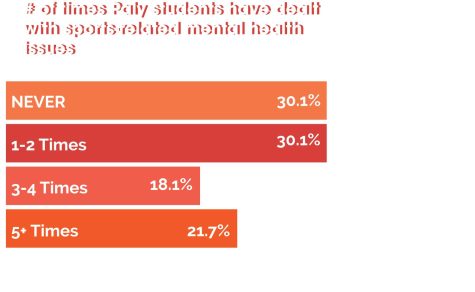Healthy Body, Healthy Mind
Mental health topics have been capturing headlines in sports media recently, and all this negative coverage has left athletes wondering whether the benefits of sports outweigh the harms. We dove into the Paly athletic experience to determine whether sports really help or harm mental health.
She had trained over 18 years for this moment.
With a total of 32 Olympic and World Championship medals, eager fans from all over the globe anticipated that yet another Olympic medal would be added to her total.
But with the eyes of the world upon her, renowned American gymnast Simone Biles used her spotlight not to perform her signature dazzling twists and flips, but instead for an even more courageous act: to take a step back from the Games for her own mental health.
At the Tokyo 2021 Olympics, Biles made the decision to withdraw from the women’s team final as well as the individual all-around competition. In a news conference following the event, Biles further opened the conversation of mental health in sports, including the pressure that athletes have become accustomed to but rarely speak out about.
“It’s been a long week, it’s been a long Olympic process, it’s been a long year,” Biles said in a press conference regarding her withdrawal. “I think we’re just a little bit too stressed out…We should be out here having fun, and sometimes that’s not the case.” It’s been a long week, it’s been a long Olympic process, it’s been a long year I think we’re just a little bit too stressed out…We should be out here having fun, and sometimes that’s not the case. — Simone Biles
Biles had arguably become the face for the 2021 Olympic games. Her fame and success had only grown since the 2016 Olympics, where she won four gold medals and one bronze. With that came the pressure of being perhaps the most highly touted gymnast ever leading up to the Games.
Leading up to the moments before she withdrew, Biles had received encouragement from those that were watching her, including her coaches and teammates who at first didn’t understand why Biles was pulling out.
In the press conference, Biles recalled what her coaches had said after she told them that her team needed to continue the competition without her.
“They were like, ‘I promise you, you’re fine. We watched you warm up,’” Biles said. “You usually don’t hear me say things like that, because I’ll usually persevere and push through things. So they were like, ‘Okay, well, if Simone says this, then we need to take it pretty seriously.’”
While at first, Biles’ decision was met with some disappointment and confusion from viewers across the world, she was ultimately applauded for her decision to prioritize her mental well-being.
“It’s okay sometimes to even sit out the big competitions to focus on yourself because it shows how strong of a competitor and person that you really are — rather than just battle through it,” Biles said.
It’s okay sometimes to even sit out the big competitions to focus on yourself because it shows how strong of a competitor and person that you really are…
— Simone Biles
The mindset that “pain makes you stronger” has been used for years in sports to dismiss mental and physical blocks, and while it can be motivational to a certain extent, it also can cause a lot of harm for athletes who are in need of help and choose not to seek it because of the ‘no pain, no gain’ mindset. Biles is now one among a growing number of people who have broken the generations of athletes “toughing it out,” and instead focusing on their mental health.
Another prime example of this phenomenon came in the 2021 Tennis French Open, where decorated player Naomi Osaka withdrew from the competition and declared she would be taking a break from tennis. She also withdrew from Wimbledon in the same year, attributing these sudden withdrawals to her continuing mental health issues. In a social media post, she spoke on her social anxiety and the pressure from the media causing her to enter into long bouts of depression.
Jamie Pardini, Ph.D., a neuropsychologist with Banner – University Sports Medicine and Concussion Specialists in Phoenix, said that when an athlete is hyper-focused on a single sport and is subject to rigorous year-round training regiments, the levels of stress can become unbearable and lead to unhealthy mental states, especially in young athletes.
This may explain how these young professional athletes can easily develop mental health issues, especially as they are thrust under the public eye due to their newfound fame. Environments where expectations and pressure to perform well are high often leads to anxiety and depressive symptoms.
The sudden wave of professional athletes opening up about their mental health has sparked an influx of media coverage on the negative impacts of sports on mental health. But all of this begs the question: are sports actually bad for mental health?
To answer this question, we must look into how sports affect not only professional athletes, but also student-athletes here at Paly.
Some of the student-athlete population does feel negative mental health effects due to their sports. For example, competition and comparing oneself with other athletes in one’s field causes stress for many student-athletes.

“One thing I just find hard, especially in swimming, is that it’s really competitive,” swimmer and water polo player Lydia Mitz (‘25) said. “It is a solo sport and you’re just trying to get better, but there are other people in the water, and you’re going to think, ‘oh, I just want to be faster.’ And it can be kind of toxic in that way.”
Competition can be an enormous source of stress for athletes. Pressure placed on performance can cause athletes to feel inadequate when they do not succeed, and unhealthy competition can cause jealousy or anger towards their peers who do succeed. A toxic and competitive environment changes learning and growing opportunities into spite, and inhibits cooperation and a positive team dynamic, while lowering the self-esteem of athletes. This takes away from the achievements of those who excel and inhibits the growth of all those on the team.
Even when there is a positive environment, team sports can cause stress as well. With so many people relying on each other, when one person makes a mistake, it affects the overall game and the whole team. Therefore there can be a lot of pressure in team sports because of the impact one player has on everybody else.
Water polo player and swimmer Anne Threlkeld (‘24) said, “the team aspect [of water polo] puts more pressure on me because I really want to do well for my team. I don’t want to let people down.”
The team aspect [of water polo] puts more pressure on me because I really want to do well for my team. I don’t want to let people down
— Anna Threlkeld
This stress, caused by a myriad of different things, often makes it hard for athletes to fully enjoy their sport. Although kids often join sports when they are young to let off some steam and have fun, many find that the stress of sports becoming more intense takes the fun out of their sport at times.
“Those nerves do get to me a lot, and it makes it harder to be completely focused, and it makes it hard to enjoy the sport as much as I would if I was more relaxed,” Threlkeld said.
Another major area where student-athletes can experience high levels of stress is during the college recruitment process. While this doesn’t affect all high school athletes, those who do undergo this experience often find it very stressful and overwhelming. Potential recruits are required to do very intense training to hone their skills to the level where recruitment is within the realm of possibility, however, as mentioned earlier, intense pressure and overfocus on sports does lead to worsening mental health.
Beyond just intense training and focus on one sport, there is also competition in this field as well, and sometimes feedback can be demoralizing and harsh.
Former Paly runner David Evans (‘21) said, “coaches will state that parts of your application aren’t good enough and need to be improved. They will openly tell you that you aren’t fast enough, or that you aren’t smart enough for their program.”
This toxic attitude surrounding recruitment can harm the self-esteem of athletes and may cause them to dive down a rabbit hole of questioning their self-worth. High-level athletes such as college recruits, college athletes, and professionals all feel the effects of this pressure. Athletes for Hope finds that “33% of all college students experience significant symptoms of depression, anxiety or other mental health conditions.”
Beyond just the stress of playing a sport to a high level, the pressure of supporting a team, and at times facing toxic competition, student athletes also have to deal with the responsibilities of the former part of that title: being a student. School can be extremely stressful for people who don’t play any sports. But student athletes must find time for homework, schoolwork and studying outside of their long practices, sometimes both before and after school hours. This can lead to a loss of sleep, which affects mood, and less time to spend relaxing or hanging out with friends, which can also harm mental health.
In the stressful environment of a competitive school, the pressure to excel in difficult classes and also devote hours of time and effort into thriving in any given sport can be a huge demand, especially in teenagers, who need time to relax, hang out with friends, and sleep.
Clearly, there are downsides to playing sports, not just at the professional level like we’ve seen with Biles and Osaka, but also here at Paly. However, playing sports is not all bad. In a positive environment, sports can also provide a plethora of positive benefits, and many athletes find their sport to be an outlet to relieve stress.
Soccer player Elsie Parigi (‘24) said, “once you’re playing, you’re on the field and nothing else really matters. You kind of forget about all that [stress] for however long you’re playing for. I think that’s nice.”
Once you’re playing, you’re on the field and nothing else really matters. You kind of forget about all that [stress] for however long you’re playing for. I think that’s nice.
— Elsie Parigi
Parigi enjoys the break from the stresses of school and home when she’s playing soccer, similar to many other athletes.
“It really helps when you can just go to your sport and take a break from your homework or your social life,” Mitz said.
For many athletes at Paly, sports can be a great outlet to relieve stress and forget about external stressors. With the pressure placed on academics at Paly, playing sports can be a crucial booster to mental health.
Sports not only relieve stress from external factors, but they can also help empower athletes during their events. In terms of recruitment, the oftentimes stressful process also can create motivation for an athlete to improve themselves and become the best they can be.
“On days that I really didn’t feel like running, I would remind myself that if I wanted to run in college [then] I would have to work harder than my competition,” Evans said.
Sports can create motivation and drive for athletes to improve their performance, not only in the sport itself, but also in applying that motivation to other parts of their lives.
More than just stress relief and motivation, Paly sports teams can be a safety net for many Paly athletes who find their connection to their team to be beneficial to their happiness.
“Everyone supports each other, [so] the environment of a team is a special bond. I feel like it’s almost different than just friends. It’s almost more than friends,” Parigi said.
Eliza Gaither, a sophomore water polo player, swimmer, and lacrosse player, said, “I think the connections you make on teams improve your mental health. Whether it be with your coach or your teammates, those relationships just make you enjoy the sport more.”
Team players are all united around a common goal, and this creates a lot of camaraderie among teammates and increases motivation and cooperation between them. Many friends who play with each other on a team sport find that their being teammates affects their external friendship in a positive manner.
There are scientific benefits, too. Exercising and playing sports releases endorphins, as well as serotonin and dopamine. These hormones can help relieve physical and mental pain and create a sense of general well-being in the body. This can have an enormous effect on the mental health of individuals. Many health professionals suggest physical exercise as a treatment for depression and anxiety, as working out has shown to ease symptoms.
“Playing a sport in general releases a lot of endorphins. So I think that exercise and creating a team with that sport just makes it 10 times better,” Gaither said.
In a Banner Health article, which featured healthy tips for athletes, Dr. Jamie Pardini emphasized that “When kids play different sports, they are exposed to different peer groups in activities that require different types of teamwork and collaboration- skills that transfer well into adulthood.”
But Dr. Pardini also noted the dangers of becoming too invested in one sport at a young age.
“Unfortunately, early specialization can be linked to negative psychological as well as physical effects,” Pardini said. “This hyper-focused, year-round training is associated with stress, burnout, and even early withdrawal from sports. These athletes experience less fun and perceive increased criticism.”
So how do team sports affect mental health differently than individual sports? Evelyn Pluhar, a philosopher who specializes in the philosophy of the mind, helps shed light on the two sides of this debate. Pluhar notes that team and individual sports affect people in different ways.
“Team sports are sometimes stressful as a result of competition, team dynamics or coaching issues, but individual sports may cause greater internal attribution such as shame after failure, which is linked to depressive symptoms,” said Pluhar in a Trine University article on Mental Health in Team Sports Compared to Individual Sports.
The expert opinion is essentially that it’s complicated. Sports can emotionally deprive student-athletes and harm their mental health, but there also can be extraordinary benefits to playing a sport and having a team. Most professionals agree that too much pressure and focus on a single sport will often harm mental health, however, this mainly affects only professional athletes who spend all their time training. Student-athletes instead must handle balancing schoolwork and training, and deal with toxic competition and high expectations.
So how can student-athletes maintain a healthy level of competition, focus, devotion, and effort in their sport? Paly athletes have their own techniques and strategies for approaching their sports in order to make them as emotionally fulfilling (and least stressful) as possible.
“I think for me, positivity is probably the most important,” Gaither said. “You just have to go into practice every day with the most positive attitude you can have, because no matter what, other people on your team could also be going through a tough day, or [they] could be dealing with struggles and you kind of just have to go in with a positive attitude and tell your teammates that you’re there for them.”
Parigi suggests taking up leadership to empower other teammates.
“I feel like being a leader and supporting other people also kind of helps you because you’re encouraging other people to do well, and it kind of rubs off on you,” she said.
Another thing Parigi tries to remember is that the only thing she can control is her effort.
“I used to get super nervous, but you have to remember to go out there and try your best,” she said. “As long as you’re doing your best, the other stuff comes in [after].”
Kindness and patience, to one’s teammates and to oneself, is also crucial to enjoying your sport.
“The downfall of sports is when your teammates yell at [each other] because you don’t know what other people are going through,” Gaither said. “So you have to make sure you give them good words of encouragement, words of validation, and just kind of work as a team all together to make sure everyone’s okay.”
Kindness, positivity, and leadership can all be ways to keep an athlete’s spirits up during a tough game, race or match.
Sports have become increasingly competitive, even at the recreational level. Often, the students playing sports at the high school level are seeking recruitment or looking for a spot on the varsity lineup. Physical injuries among high school athletes are extremely prevalent. Just as recovering from a torn ACL or a sprained wrist is vital, emphasis on mental health care is essential to address as well.
Not always evident on the outside, mental health issues are often overlooked, especially within the athletic community. Before games and meets, high school athletes are often primed with warm-ups, stretches, and drills. Words of encouragement are sometimes sprinkled into the mix but rarely is a serious mental health check incorporated. Sometimes, high school athletes may put pressure on themselves to “tough it out” or “suck it up”.
However, open discussion about mental health from professional athletes like Osaka and Biles can increase the awareness surrounding these issues, and can also increase the availability of support for athletes of any level who may be struggling with similar issues.
Simone Biles stated in a press conference regarding her withdrawal from the Olympics, “I say put mental health first. Because if you don’t, then you’re not going to enjoy your sport and you’re not going to succeed.”
At Paly, having that type of environment where mental health is put first is essential. Where athletes are supported physically as well as mentally. Where sports can be a solution to stress instead of the cause of it. Where athletes can enjoy their sport and reap the mental health benefits that playing a sport can provide. That is the type of environment we should strive towards.
I say put mental health first. Because if you don’t, then you’re not going to enjoy your sport and you’re not going to succeed.
— Simone Biles

Hi! I'm Grace, Editor-in-Chief for Viking's 2023-2024 school year. I am a four-year member of the Paly varsity swim team, and I also played water polo...







